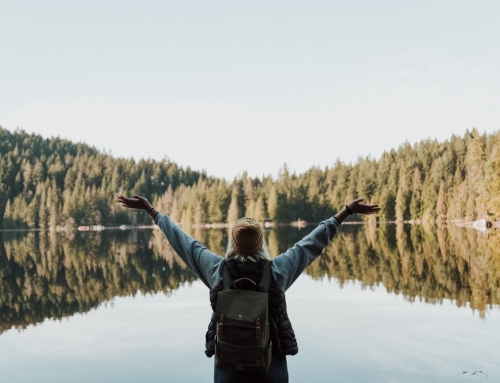We live in a time where moving around the globe is more affordable and countries are more accessible than ever before. Packing a suitcase and hopping on a flight has never been easier, just a few taps on your smartphone and off you go!
Our generation has the gift that makes it possible to become nomads for as little or as long as we wish. Delaying settling down is not a cliché, it is IN!
Think about your parents or grandparents generation, how often did they travel? Did your grandma strap on a backpack and go to explore new destinations and enjoy some beach time in a far away place? Before the 1950’s travelling was uncommon, and people would go on long backpacking trips only to migrate to a new place and stay, with the hope of a better life – a once in a lifetime trip.
Ok, ok, but our parents are not that ancient. Travel has been popular and relatively affordable since the 1970’s. Backpacking on a tight budget around the globe is nothing new, after all the hippies did it too! They had the “Invisible Post”, which was a word-of-mouth travel guide shared between the community of travellers about the best and cheapest places to visit, much like today’s Instagram, yet only for the few that could find it. But how many have actually done it? Taking a flight to South East Asia was much more expensive, and information about how to travel there was rare. Going backpacking on a tight budget was for the true adventurers back then.
Now that we established that times have changed, let us take a step back and clarify a few things. When we say generation nomads, we are referring to our generation – we are some of the lucky or unlucky people that are referred to as Millennials or Generation Y. Millennials are defined as people that reach young adulthood in the beginning of the 21stcentury, born between 1980 and 1995 (exact years vary between definitions).
What is so special about us Millennials?
We are the most confused generation of adults so far! With all the technological advancements, the abundance of information at our finger tips, the non-stop connection to anyone anywhere in the world, and proof of life on Mars! No wonder we are so confused… The possibilities are endless. We can learn anything we desire online, mostly even for free. Our phones and watches are beeping continuously and we are expected to answer within seconds of receiving a message. We are experiencing new phenomena that our parents cannot guide us through or do not even understand.
How does this all relate to the ancient nomads?
A nomad is someone who moves around regularly from one place to another rather than living in one place all the time. Traditionally, nomads were groups of people or tribes that would move around due to weather conditions or seeking for new habitable places to grow livestock. These days in most countries, and especially in the Western world, food is available in abundance in super markets and we are able to live in almost any weather conditions thanks to modern housing.
So why move around?
The answer can be two-fold. 1) It is easy to move around and live in different places. 2) All this confusion we mentioned earlier means we are constantly seeking something else, somethinag better, something new. We have defined 4 factors that make us a generation of nomads, read below to find out more.
1. Globalization has made travel easier and more accessible
The world is becoming a global village, as more people from different countries are able to interact with each other, exchange ideas, and learn about different cultures. Globalization refers to a trend towards a more integrated global system and freer movement of goods as well as people. The European Union is an example, where all boarders have been opened for the free movement of people and economic goods. Once you enter a country in the EU, you can move around to any other country without passport control.
It has a profound impact on where we travel and for how long. Comparing travelling today to 50 years ago, we are able to easily visit so many countries with little obstacles. Think about the fall of the Berlin wall and the disbandment of the USSR in the 1990’s and the progress that has been made to today. China has loosened up its boarders to the world in recent decades. Relationships between countries are improving overall, and any passport can allow you to visit more countries than it did in the past. You can check on PassportIndex.org, which countries your passport can access with a free visa and which require a paid visa.
2. Travel is not only for the rich
With budget airlines popping up in the last years and more options for accommodations, it is possible to travel super luxurious or dirt-cheap anywhere in the world.
Cheaper flights and more routes
There are more affordable options for moving around the world, specifically flying has become much cheaper over the last 50 years. In the 1950’s you would have had to pay 40% more for the same flight ticket you would buy today, which would be almost equivalent to a full month’s salary (source). For instance, flying from New York to London in 1959 would cost $3,800 for regular economy class (source). Unthinkable today! Nonetheless, it has a down side too. Flights comfort and customer service have decreased significantly since the Golden Age of Flying due to airlines trying to cut costs, compensating on food and legroom.
There are also more direct flights these days, meaning that you can spend less time in the air and more time on ground exploring new destinations. Moreover, since commercial flying emerged in the 1950’s, it has become the safest mode of transport. Statistically, air travel is safer than car, boat, or train travel (source).
These days, everything is online! Finding and comparing accommodations has never been easier. You can go on any booking site and set on filters that suit your needs and budget and for sure find the most suitable accommodation at your destination. The sharing economy has also had an impact on the amount of accommodations we can choose from. With platforms like Airbnb, we are not bound to hotels and guesthouses, but we are able to stay at other travellers cribs.
Easier to find accommodation, even for free!
Options for free accommodations have also existed for some time. You can stay for free almost anywhere in the world through Couch Surfing or stay at some pretty amazing villas while taking care of others pets through House Sitting. More and more creative platforms offering free lodging possibilities are coming up, which is positive news for the budget traveller!
3. A generation of Digital Nomads
Through advancement in technology, we are able to work from anywhere. All you need is a connection to the Internet and you can do anything from running a full-blown business to freelancing projects for an employer. There are tons of options out there and a lot of material online explaining how to do it. Digital nomads work anywhere from hotel rooms to cafes, to co-working spaces, to recreational vehicles. It is not an odd site to walk into a trendy coffee shop anywhere in the world and see a bunch of people on their laptops working away.
Availability of Internet
Internet connectivity and speed worldwide have increased immensely over the last decade and are steadily on the rise. It is now a given that any hotel or café would have free unlimited WIFI that you can use to work. Although, with our experience it is not always easy to find stable and fast Internet everywhere, so there is still some room for improvement on that end.
Mobile Internet is getting cheaper and faster
Besides landline WIFI connection, many digital nomads use mobile Internet plans to support their work. 4G Internet is the standard in most countries and the cost is steadily decreasing overall. For instance, we have paid as little as 0.25 Euro per GB in Sri Lanka and 5 Euros for a month of unlimited Internet in Thailand. The future looks bright for digital nomads as mobile Internet becomes cheaper and more widely accessible.
It is more acceptable for employers to seek remote freelancers
Small or large corporations all want to have the best and brightest working for them. With the advancements in technology described above, it is widely acceptable for employers to hire remote workers on a freelance basis or even full-time. Think about it, it is actually cheaper for an employer to have you working remotely than pay for a desk for you in an office building. In some cases all you need is access to your email to communicate about your work, in others you might need to video chat with your employer.
4. Millennials have a yearning for self-fulfillment
Be it an intrinsic or extrinsic motivation, our generation is definitely taking more “me” time than previous generations. In the past the path was clear: finish high school, get a degree or learn a craft, get a job or start a business, start a family, and grow old 🙂 Our parents’ generation had it easy, society expected something and by doing that you would be fulfilled. You would start a career with a company, and stay there for as long as you could, building a nice pension fund for retirement. If you did not follow the usual path of life, you would be an adventurous outlier. These days it is more than ok to spend more time on discovering what we want, rather than following a preset path.
We are faced with endless possibilities
Our generation has the gift and the curse of unlimited opportunities and abundance of knowledge thanks to the Internet. It is like being a kid in a candy store. Learning to do anything is more accessible than ever before. We are exposed to a variety of lifestyles through blogs and social media run by average people just like us. It just begs the question: why not become a Youtube celebrity, run a multi-billion online shop, and travel the world staying in amazing hotels gazing over the sunset from our own private infinity pool? It seems like everything is possible with a laptop and Internet. Choosing one single career path and following through with it is not the norm. Changing a company every 2-5 years is accepted. Changing job titles every year is also ok. We cannot decide what we want to do and how we want to live.
Our generation is overwhelmed
Deciding on what we want to do for a living and settling down in one place have never been more trivial questions. We are overwhelmed by the amount of options, and therefore we need time to explore and understand ourselves. Finding out how we want to live our lives and what we want to contribute to the world has become the quest of many millennials. Our 20’s (maybe even 30’s) are for us and us only! We have certain desires, which we cannot even begin to define, and we need at least a decade to figure things out. Self-fulfillment has become an issue for our generation. Starting a family in the Western world before 30 years of age is become more seldom. Average millennials take 10-15 years after reaching adulthood to figure out what they want in life.
Generation nomads
Just like the ancient nomads moved around seeking better places to live, our generation is moving around both mentally and physically searching for a better life. We are on a quest to find something else, something different, something better. On a physical level, we move around, traveling to or living in different places to experience different cultures, new weather conditions, foreign flavors, and most of all meet a variety of people. On a mental level, we try to find fulfillment or the meaning of our life. Having at least a decade of designated “me” time gives us space to experiment, explore, and change everything several times over. This is also visible through the growing number of job changes a millennial goes through in their 20’s.
We are nomads because of the world we were born in to and because we choose to be. Our generation’s quest for a fulfilling life is supported by technological capabilities and society’s acceptance of the new norms created. Travelling is one common form of being a nomad, however there are other forms that our generation portrays. We hope that we were able to shed some light on why we believe we are a generation of nomads. Through our research, we hope to uncover to what extent our assumptions are true and inspire others to think beyond the limitations of our previous generation’s.








Leave a Reply